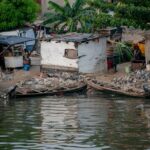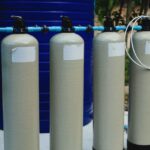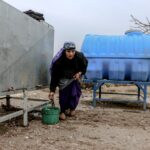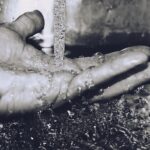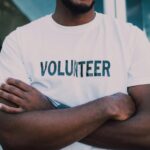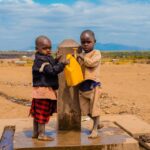The Ripple Effect of Unsafe Water in Liberia

Water, like we all know, is life. But what happens when the water people drink is not safe? In Liberia, many people do not have access to clean water. This leads to many problems, affecting health, schools, jobs, and even food. When one problem leads to another, it creates a ripple effect. This means that unsafe water does not just cause sickness – it affects every part of life. In this article, we will look at how unsafe water creates bigger problems for families, communities, and the country.
Health Problems and Disease Spread
When people drink dirty water, they get sick. Diseases like cholera, typhoid, and diarrhea are very common in places where clean water is hard to find. Children are the most affected because their bodies are not strong enough to fight these diseases. Pregnant women and older people also suffer a lot.
Many children in Liberia die every year because of diseases from dirty water. Some people think boiling water can help, but not everyone has firewood or gas to boil water every day. Others may not even know the water is unsafe until they get sick.
The Burden on Healthcare Facilities
When many people fall sick because of dirty water, hospitals and clinics become overcrowded. Doctors and nurses struggle to treat everyone, and sometimes there are not enough medicines or beds.
Families also face a big challenge. Medical treatment costs money, and not everyone can afford it. Many people end up spending money on hospital bills instead of food, school fees, or other basic needs.
The government also spends a lot of money fighting waterborne diseases. This money could have been used to build better roads, schools, and other important things for the country.
Loss of Productivity and Economic Impact
When people are sick, they cannot go to work. This means they do not earn money to feed their families. Farmers cannot go to their farms, market women cannot sell goods, and office workers miss important tasks.
Even children miss school when they are sick. If they are absent too often, they may drop out. This affects the future of the country because education is important for growth.
When too many people are sick, businesses slow down, and the economy suffers. A country cannot develop if its people are too sick to work or learn.
Unsafe Water and Its Effect on Education
When children drink unsafe water, they often get sick. This means they have to stay home or go to the hospital. Either way, they miss school. Some may be absent for days or even weeks, while others drop out completely because they are too weak or their families cannot afford hospital bills and school fees at the same time.
Even when children manage to attend school, they may struggle to concentrate. Stomach pain, dehydration, or some form of discomfort can make it hard for them to learn properly.
In some areas, schools do not have clean water or good toilets. This makes learning uncomfortable, especially for girls who need proper hygiene. Schools suffer a lot when there is no clean water – spreading diseases with ease becomes the order of the day.
The Burden on Women and Girls
In most African countries, if not all, women and girls are often the ones who collect water for their families. Liberian women and girls are no exception. In places where there is no clean water, they walk long distances every day to fetch it, taking lots of time and energy. Girls miss school sometimes because they have to fetch water early in the morning.
Sometimes, women and girls have to go to unsafe areas, putting them at risk of danger, including attacks or accidents. Carrying heavy buckets of water can also affect their health, causing body pain and stress.
For women, this daily struggle means less time for jobs or starting small businesses. If they could access clean water nearby, they would have more opportunities to work, learn, and take better care of their families.
Unsafe water also puts women at risk of infections, especially during pregnancy. Without clean water, keeping themselves and their babies healthy becomes a big challenge.
Food and Agriculture Challenges
Farmers need clean water to grow food and raise animals. When the water is unsafe, crops do not grow well, and animals can get sick. This leads to less food for families and higher food prices in the markets.
People who depend on fishing also face problems. If the water is polluted, fish die, and fishermen cannot catch enough to sell. This affects their income and makes it harder for families to buy food.
If people eat food that was grown with contaminated water, they can get sick. This makes the food crisis even worse because many people in Liberia already struggle to afford healthy meals.
The Impact on Urban and Rural Communities
Unsafe water affects both cities and villages, but in different ways. In crowded city areas, many people rely on shared water sources. If these sources are contaminated, diseases spread quickly. Poor drainage and waste disposal also make water pollution worse.
In rural areas, people often walk long distances to fetch water from rivers or wells. These water sources are not always safe because animals, waste, and chemicals can contaminate them. Many villages do not have proper toilets, making water pollution a bigger problem.
When water is unsafe, an entire community, whether rural or urban, suffers. Businesses slow, schools struggle, hospitals overcrowd, and families face more financial problems.
A lack of clean water also makes it difficult for communities to attract investors or development projects. No company wants to set up a business in a place where workers are always sick or where there is no reliable water supply.
Both urban and rural areas need better access to clean water. Without it, daily life remains a struggle, and people keep suffering from preventable diseases.
Climate Change and Its Effect on Water Safety
Climate change is making Liberia’s water crisis worse. Longer dry seasons mean water sources dry up, forcing people to travel farther for water. Heavy rains and floods, on the other hand, wash dirt and waste into rivers, making the water unsafe to drink. As weather patterns continue to change, the challenge of finding clean water grows even bigger.
To protect water sources, Liberia needs stronger systems to manage floods and droughts. Planting more trees, preventing pollution, and building better water storage systems can help communities have safe water all year round. If action isn’t taken, the water crisis will only get worse, affecting more lives in the future.
Environmental Consequences
When water is not properly managed, it doesn’t just affect people – it also harms nature. Rivers, lakes, and groundwater become polluted from human waste, trash, and chemicals. When these water sources are dirty, fish and other animals that depend on them start to die.
Deforestation and poor farming methods also make the water problem worse. When trees are cut down, there is nothing to stop rain from washing soil and dirt into rivers. This makes the water muddy and unsafe for drinking.
If Liberia does not protect its water sources, the problem will continue to grow. The country needs to take care of the environment to ensure that future generations have clean water to drink, cook, and farm with.
Government and NGO Efforts to Improve Water Safety
The Liberian government, along with local and international organizations, has been working to improve water safety. Some projects focus on building wells and boreholes in rural areas, while others improve sanitation in cities.
Non-governmental organizations (NGOs) like Aqua Maya are also stepping in to help. They work to provide clean and safe drinking water to underserved communities, making sure people do not have to rely on unsafe water sources.
Despite these efforts, many people in Liberia still do not have access to clean water. More funding, better management, and stronger policies are needed to make safe water available to everyone.
The Role of Communities in Solving the Water Crisis
While governments and organizations play a big role, local communities also have a part in solving the water crisis. People can help by keeping their surroundings clean, properly disposing of waste, and protecting water sources from pollution.
Education is also important. When communities learn about the dangers of unsafe water and how to purify it, they can take steps to protect their health. Schools, churches, and local leaders can help spread awareness about safe water practices.
By working together, communities can make a big difference. Small actions, like boiling water before drinking or using covered wells, can save lives and prevent diseases.
Conclusion
Unsafe water is a big problem in Liberia, affecting health, education, jobs, and even the environment. Farmers lose crops, hospitals become overcrowded, and businesses suffer. Communities, especially women and children, bear the greatest burden.
The good news is that this problem can be solved. The government, organizations, and communities must work together to improve water quality. Projects like those from Aqua Maya are already making a difference by bringing clean water to those who need it most, but more needs to be done.
Everyone has a role to play – whether it’s investing in better water systems, educating people on safe water use, or simply protecting rivers and wells from pollution. Clean water is not a luxury; it is a basic need. A healthier Liberia starts with safe drinking water for all.
Sources
1. https://www.unicef.org/liberia/water-sanitation-and-hygiene
2. https://www.wateraid.org/us/where-we-work/liberia
3. https://www.concern.net/news/dirty-water-brings-life-threatening-risk-liberia

